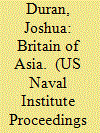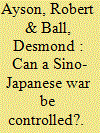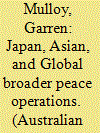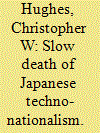|
|
|
Sort Order |
|
|
|
Items / Page
|
|
|
|
|
|
|
| Srl | Item |
| 1 |
ID:
142405


|
|
|
| 2 |
ID:
138613


|
|
|
|
|
| Summary/Abstract |
It has been decades since the last war between major powers in Asia, but there is no guarantee that the region will always be able to avoid conflict. The greatest strain on the peace is in North Asia, where there has been rising tension between China and Japan. What begins as a
minor skirmish between China and Japan could conceivably escalate into a more serious conflict that involved the United States and, in the worst case, the use of nuclear weapons by Beijing and Washington. Even a major conventional conflict (between just Japan and China, or
involving all three) could be devastating for North Asia and the wider region, leading to a significant loss of life and widespread political, institutional and economic damage.
|
|
|
|
|
|
|
|
|
|
|
|
|
|
|
|
| 3 |
ID:
175663


|
|
|
|
|
| Summary/Abstract |
After WWII, Japan established a unique system of civil–military relations and civilian control of its Self-Defense Forces (JSDF), characterised by bureaucratic rather than political control. For more than half a century, military influence on defence policymaking had been comparably low, depriving political leaders of a critical source of knowledge on national security. Yet, the latter half of the 2000s saw several institutional changes which resulted in the wide-reaching inclusion of military officials in national security policymaking. Why did a democratic Japan, shaped by WWII experiences, see the need for more military influence? The cause for this development ultimately lies within a changing security environment which lends credit to the broader argument that Japan has embraced a ‘realpolitik’ approach to national security.
|
|
|
|
|
|
|
|
|
|
|
|
|
|
|
|
| 4 |
ID:
176224


|
|
|
|
|
| Summary/Abstract |
This paper examines Japanese unity of Overseas Despatch Operation (ODO) actors, laws, and operational aspects, interaction with state and institutional actors, ‘4C’ functional regional engagement and concepts of partnership, and Japan’s United Nations Peace Operations-Humanitarian Assistance Disaster Relief Operations (UNPO-HADRO) nexus. Japanese cooperation for dual liberal-international peace and realist security goals within increasing regional strategic competition and nationalist antipathy is examined, particularly in Japan’s ‘poor neighbourhood’. The paper questions why, despite undoubted expertise, Japan has not emerged as a regional UNPO-HADRO development leader, and whether Japanese UNPO-HADRO and ‘pro-active pacifism’ approaches are utilising UNPO-HADRO for Asia-regional strategic competition purposes? Japanese ODO have played important functional engagement, value sharing, and institutional socialisation roles, with integrated legal-civil–military holistic approaches providing models for others and foundations for partnerships. However, despite specialist capacity-building knowledge transfer efforts Asian disquiet remains concerning cooperation and partnership. Japan remains highly risk-averse, raising questions regarding its dependability, and ‘HADRO-CIMIC superpower-aspirations’, or bridging-actor role between Indo-Pacific and ‘Northern-Developed’ practitioners, can be evaluated by Japan’s modest present UNPO actor status. Japanese leadership and initiative is limited by its neighborhood and attendant institutions, but also by its self-perceived identity shaped by historical, alliance, and leadership challenges to manage relative decline.
|
|
|
|
|
|
|
|
|
|
|
|
|
|
|
|
| 5 |
ID:
105084


|
|
|
|
|
| Publication |
2011.
|
| Summary/Abstract |
Japan's defense production model is often portrayed as an exemplar of techno-nationalism, but can it serve as a model for China to follow in pursuit of technological military catch-up? Japan in the past has exploited civilian industrial strengths to create a defense production base with footholds in key technologies. However, Japan's defense production model is now displaying structural limits - constrained defense budgets, deficient procurement management, limited international collaboration - with the risks of civilian industry exiting the sector, the loss of even basic competency in military technologies, and the consequent weakening of national security autonomy. Japan's case thus offers emerging comparative lessons for China to study in what to do and not to in pursuing civilian-military integration.
|
|
|
|
|
|
|
|
|
|
|
|
|
|
|
|
|
|
|
|
|